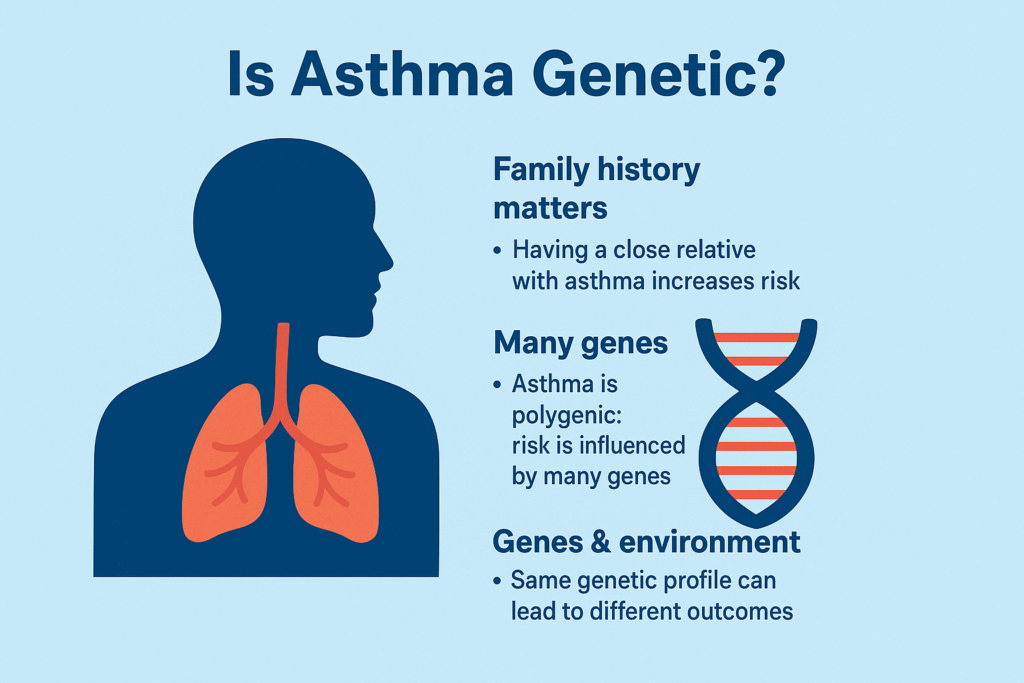Asthma is a common, chronic lung condition marked by airway inflammation, wheeze, shortness of breath and cough. A frequent question is: Is asthma genetic? Short answer: genetics influence asthma risk, but they don’t act alone — asthma is a complex trait driven by many genes plus environmental and lifestyle factors.

Family history matters — but it’s not destiny
Having a close relative with asthma is one of the strongest risk indicators. Studies show that children with an asthmatic parent are several times more likely to develop asthma themselves. That increased likelihood reflects inherited susceptibility (shared genes) and often shared exposures — for example indoor allergens, tobacco smoke or similar living environments. Still, a genetic predisposition does not guarantee asthma; many people with risk genes never develop the disease. Healthline
Many genes — a polygenic picture
Unlike single-gene diseases (e.g., cystic fibrosis), asthma is polygenic: risk is influenced by many genetic variants, each contributing a small effect. Large genome-wide association studies (GWAS) have identified dozens — now hundreds — of loci linked to asthma and related traits (airflow, allergic sensitization). These discoveries help researchers map biological pathways involved in airway inflammation, immune regulation and lung function. Because the effect of each variant is modest, researchers are building polygenic risk scores to estimate overall genetic susceptibility, though these tools are still evolving and are not yet part of routine clinical care for most people. Nature

Genes interact with environment — the critical partnership
Genetics alone rarely explains asthma onset or severity. Important gene–environment interactions mean that the same genetic profile can lead to very different outcomes depending on exposures. For instance, some genetic variants make people more sensitive to air pollution or tobacco smoke, increasing symptom severity or triggering earlier onset. This interaction explains why genetic studies often find different signals across populations and why public-health measures (reducing pollution, avoiding smoke) can lower asthma burden even in genetically susceptible groups. National Institutes of Health (NIH)
Epigenetics and early-life windows
Beyond DNA sequence, epigenetic changes — chemical tags that influence gene expression — are emerging as important for asthma. Early-life events such as viral infections, antibiotic exposure, diet and prenatal smoke exposure can alter epigenetic marks and shape immune development, potentially changing long-term risk. This helps explain why timing of exposures (for example in infancy) matters so much for whether a genetically susceptible child actually develops asthma. (Research in this area is active and growing.) Nature

Clinical implications: testing, prevention and treatment
At present, genetic testing for routine asthma prediction is limited. Family history remains the most practical risk signal in clinical settings. For high-risk individuals, clinicians focus on preventing and managing triggers (allergens, smoke, pollution), monitoring lung function, and using personalised treatment plans. Research into polygenic risk assessments and precision medicine (matching therapy to genetic or molecular subtypes) is advancing, but widespread clinical use is not yet standard. If you have family members with asthma, discuss risk reduction and early signs with your doctor. Mayo Clinic
Bottom line
Asthma is partially genetic, but not purely inherited. Many genes contribute small effects, and environment, lifestyle and epigenetic factors determine whether genetic risk actually results in disease. Knowing family history helps identify who might benefit from early prevention and careful management, while ongoing genetic research aims to improve risk prediction and develop more targeted treatments in the future.



